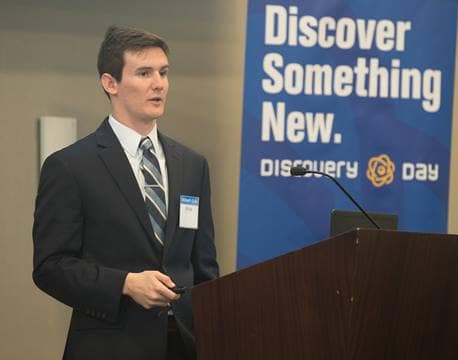 Degree Program: Aerospace Engineering - Astronautics
Degree Program: Aerospace Engineering - Astronautics
Year: Junior
How has undergraduate research impacted your life?
Participating in undergraduate research has opened many doors that I never expected to be available to me. My involvement in research began as something to help me find a career and simply as a resume builder, but it quickly became something I am passionate about. It has allowed me to explore different areas within the engineering field and make meaningful contributions to my community, while motivating me to pursue my PhD. to continue my research.
What does research mean to you?
To me, research is asking questions to solve current real-world problems, and increase our understanding of the world.
Describe some of the projects you have worked on.
The Archimedes Initiative: I began The Archimedes Initiative in the spring semester of my freshman year in an attempt to bring water to those in the developing world. The idea was to eliminate the extensive trek taken daily by many men and women around the world, and bring the water they need to them. The goal of this project was really two pronged: one to provide water to those who need it, and to develop students academically and professionally for their careers. This project is developing two water pumps - one wind, one solar - to determine which one may be most effective in achieving the design requirements. Currently, the designs are ending construction and testing will begin soon. Once this is completed, a comparative feasibility study will be conducted to determine the better performing design.
Suborbital Spaceflight Simulations Laboratory/ Mission Control Center: So, at the SSFS/MCC I have worked closely with Dr. Llanos in studying flight trajectory models of SpaceShipTwo (SS2) based on varying flight parameters. Our primary focus had been Main Engine Cutoff Altitude and how that effected different flight parameters of the vehicle - apogee, reentry, and glide. We actually produced a paper "Flight Operations Quality Assurance Analysis for Contingency Scenarios of SpaceShipTwo using ERAU's Suborbital Flight Simulator" that was going to be present at the AIAA Space Forum last September, but, unfortunately the conference was cancelled due to the hurricane. More recently we have been focusing on nominal flight scenarios and comparing control flights to science data collection missions to determine the effect the data collections processes had on the flight trajectories. We ended up presenting a paper, "Nominal SpaceShipTwo Flights Conducted by Scientist-Astronaut Candidates in a Suborbital Space Flight Simulator" at the Space Traffic Management Conference hosted here back in January. It was doing this research, and in my coursework, that really sparked my interest in exploring astrodynamics and spacecraft control has my career field.
MATLAB Convolutional Neural Network: Currently, I have been working with Dr. Troy Henderson in developing a MATLAB Convolutional Neural Network for spacecraft identification and attitude determination. The convolutional neural network is a type of Deep Learning system that is trained based on given data set. This trained network can then use what it has learned to identify similar properties on other spacecraft. The idea here is that if we can identify spacecraft and its attitude parameters based on resolved images, we can determine potential causes of failure, and increase accuracy in optical orbit determinations. This project was actually just recently awarded funding, so I am definitely excited to get working even further on this project.
